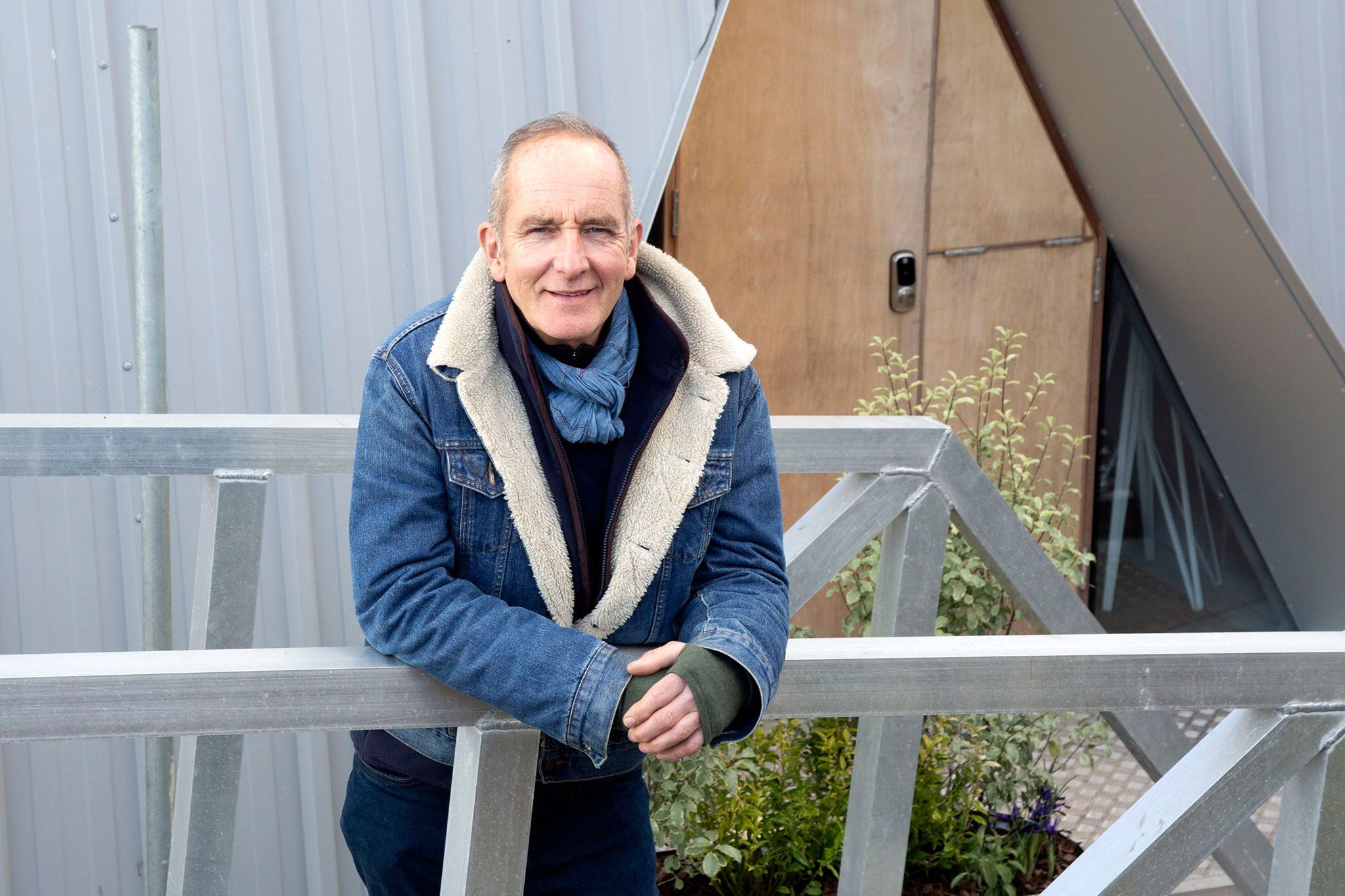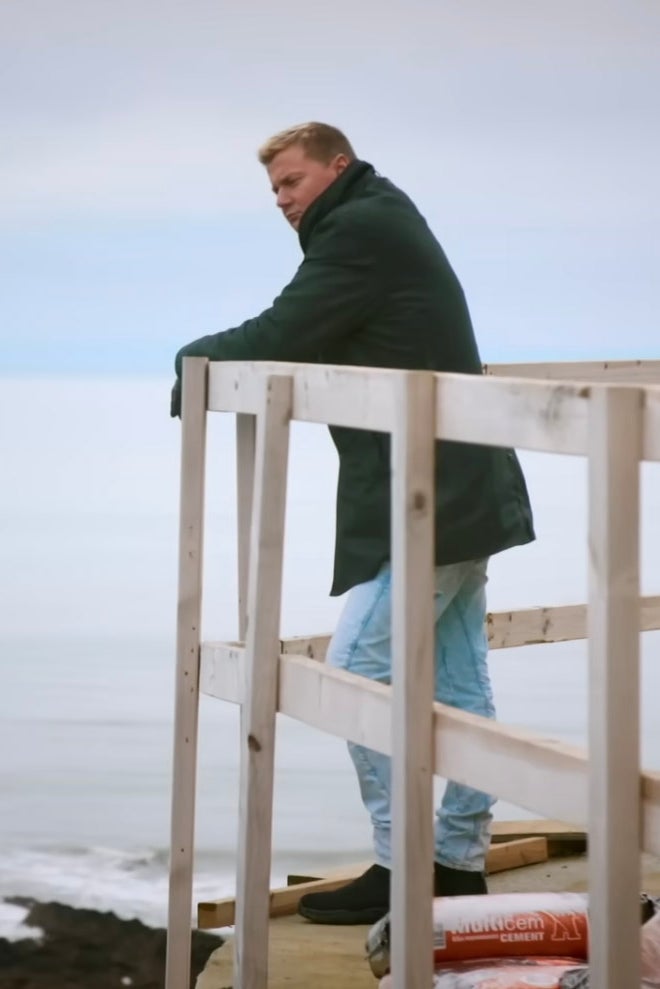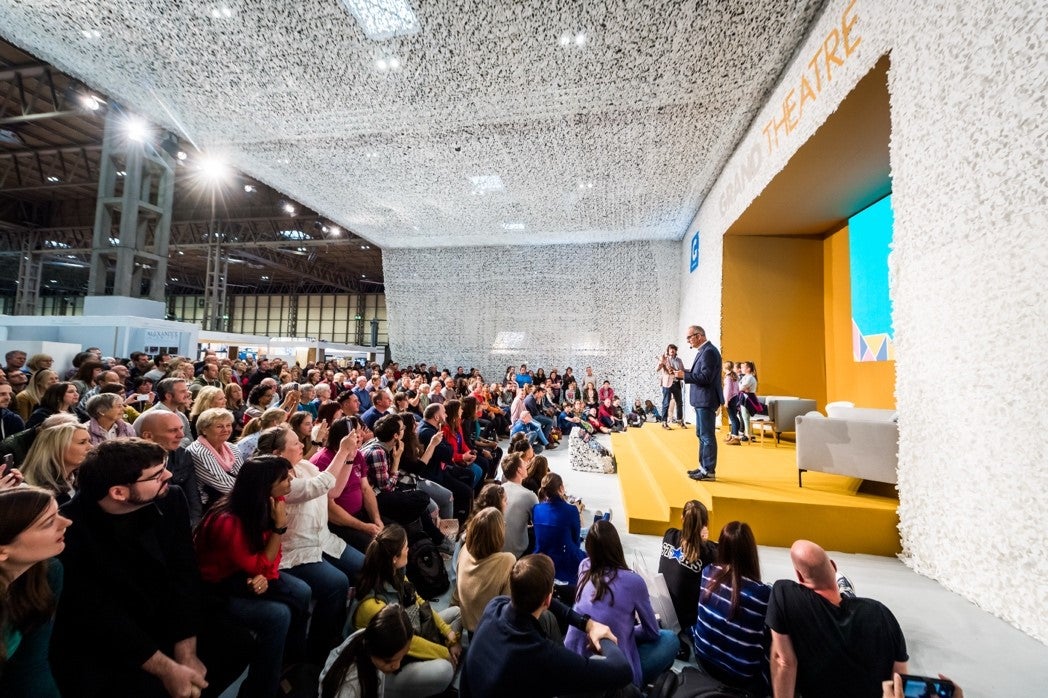
Kevin McCloud, gentle king of TV house builds and comfy winter fleeces, won’t tell me what he can’t stand about modern homes. “That’s the whole issue of taste,” the Grand Designs presenter says, in that reassuringly sonorous voice of his. “Yours is not mine, and mine is not yours.” Yes, Kevin McCloud, but surely there’s something. What about my personal bugbear: the pervasive colour drainage afflicting interiors across the land, which has been dubbed “the grey plague”, “sad beige” or even “millennial beige”? McCloud won’t bite. “What did beige ever do to you that it should be vilified in such a way?” the 65-year-old shoots back.
OK, I tell him, we can avoid specifics. He ums and ahs. “I suppose I don’t like ideas which are superficial,” he says. It’s the designer in him. “When, for instance, you make a new chair, there’s a huge weight of responsibility. There are thousands of chair designs out there and only a handful are any good. There’s no point designing a chair if you can’t make it better than a Hans Wegner 1945 chair, or a Charles and Ray Eames desk chair, and anybody who’s designing stuff that doesn’t meet that threshold should stop designing. We should not have that product on the planet.” He looks a bit taken aback by the force of his words. “That’s quite a fascist idea, isn’t it?”
For a man who’s more or less been the warm, stoic face of Channel 4 factual entertainment since 1999, when Grand Designs first graced our screens, McCloud is something of an enigma. In conversation, he takes a while to loosen up, at first keeping his thoughts and personal feelings tapered down, before they seem to spill out helplessly. Only some of them, though: his personal life (he is believed to be married, and has four children from two previous relationships) is off-limits. In fact, I have no idea from where he’s even video-calling today, nor anything about his surroundings. The bookshelf behind him has been digitally blurred by his Zoom account, leaving McCloud a floating head on my laptop screen. Questions about his own home – kitchen island or no kitchen island?; colour or beige?; TV in the bedroom or TV in the lounge? – will also not be answered. “It’s a simple equation,” he says. “The more of your private life you put into the public domain, the smaller your private life is.”
It’s not too surprising, I suppose. McCloud’s fame was a bit of a happy mistake. He was an Oxford-educated interior designer running his own lighting company when he was first asked to appear on the BBC’s Homefront in 1996 (“Kevin McCloud shows how to make a chandelier from an old bicycle wheel” – that sort of thing), then to be the host of Grand Designs three years later. Few expected much from the show.
“The prevailing mood in television in the Nineties was quite exploitative,” he recalls. “There was a general feeling in the early series from contributors that we were there to show them up and to paint them badly.” Voices within Channel 4 were also sceptical of the programme. “We were being celebratory of these self-builders, and there was a suspicion from within television that in being celebratory, we were somehow not maintaining that critical, editorial edge of scepticism ourselves. So we were quite radical, weirdly.”
Even more radical is the idea that Grand Designs is one of the best shows on British TV. But it really is, isn’t it? Each episode is shot over numerous years, with McCloud interacting with self-builders – of often ambiguous wealth – from the first architectural sketch to the laying of the final brick. And that’s if they finish at all. The thrill lies in its innate drama, with designers setting forth fantastical visions, only to be struck down – typically by their own hubris. There are the setbacks you can see coming from a mile off (remember that Exeter couple’s £125,000 kitchen?) and the setbacks you can’t (Covid!). And then there’s McCloud, ever-watchful, ever-sober, serving as a shoulder to cry on or a sharer of wisdom that builders can either listen to or not. (They rarely do.)
One of the very worst things that happened in this country was when Thatcher told us to view homes as assets that we could monetise, as opposed to a basic human right
He thinks the show’s continued success is down to its heart. “There’s a moment, in almost every episode, where we begin to see these characters as heroes,” he says. “There’s something very classical about the format. Only occasionally have we had projects which are just miserable.” He mentions the infamous 11-year journey of Edward Short’s ambitious Devon lighthouse, known as the show’s “saddest ever” build. In the process, Short’s marriage broke down and the project went over budget by £7m. “In his first episode [broadcast in 2019], it was very bleak. It was a story of overreaching, about losing everything. But when we revisited him [in an episode broadcast in 2022], he’d sort of finished the lighthouse and he was roughly in control. It was a much more redemptive ending.”
I’m talking to McCloud in advance of Grand Designs Live, an in-person embodiment of the show’s massive appeal. Held across four days in May at London’s Excel Centre, it will host talks and interactive experiences all linked to the latest developments in home and interiors. “It’s not simply about exhibitors selling stuff, because that could happen online,” he says. “It’s about the meeting of people and the melding of human energies, and that’s really, really powerful.” It’s also about silliness. He talks excitedly about a “flatpack world championship” due to take place, in which competitors are tasked with building furniture as quickly as possible, all in the hopes of winning a giant gilded Allen key. (I am briefly convinced he’s having me on, but later I am told that this is, in fact, scheduled to occur.)

He says he’s not too bothered by his own recognisability when appearing at these kinds of events, or people asking him for selfies. But I’m curious how he feels about his, well, allure. For years, McCloud has been described as something of a pin-up. “The one your wives all fancy,” wrote the Daily Mail in 2009. “Why we have a crush on Kevin McCloud” joined GQ in 2015. One unusually non-inflammatory thread on Mumsnet was quite literally titled: “Am I being unreasonable for having erotic dreams about Kevin McCloud?” When I broach this, McCloud blanches. “Not any more, Adam – I’m too old,” he sighs. I’ve seen recent tweets, I insist. “Do you really believe in this stuff?”
He admits to not liking that kind of attention very much. “It’s difficult,” he says. “I wish it weren’t the case. There will always be that person who…” he trails off. “One day you’ll open your front door and there they are standing there, and you don’t know who they are or how they found you. It’s never, thank god, happened. But it’s nearly happened, and you don’t want it to happen.” He thumbs his chin. “You see how distorting the camera lens is and how somebody gets it into their head and it’s not true, it’s not real. It’s not mentally healthy for individuals… the whole ‘cult of celebrity’. It’s damaging, and…” He pauses. “We move on.” I tell him I didn’t expect quite such a dark answer. “Well, it was a dark question, that’s why!” He laughs. I laugh, sheepishly. We move on.
McCloud is a funny kind of famous person. When I tell friends and colleagues I’m due to interview him, many respond with the kind of giddy enthusiasm typically reserved for A-list movie stars. But McCloud himself is also deeply resistant to the apparent boons of his kind of celebrity – any attempt at ego-stroking is cast aside; the idea of leaning into his notoriety seems incredibly alien to him. Unlike many people in the public eye, he is far more comfortable talking about politics than anything to do with himself.

I ask if he ever gets angry. He mutes his microphone, turning to his left and mouthing something. Presumably to his wife, or maybe a pet cat, or a house plant – who is to say? “I asked the room,” he replies, after unmuting himself. “I’m told I never get enraged, though inside I might be seething.” He says his anger is typically of a more righteous bent. “I get angry about the quality of the built environment and the failure of institutions and governments to behave responsibly,” he says. “Quality” is something he reiterates throughout our conversation. It’s the ethos that underpins Grand Designs Live and the vendors there, and what he believes is missing from the country’s housing infrastructure as a whole.
“‘Quality’ is almost a dirty word in government now,” he says. “They express themselves in numbers. So Rachel Reeves’ great announcement about how we’re going to construct the UK was literally expressed in numbers, as if she were an economist. What I’m waiting for is somebody to stand up in parliament and say, ‘We believe in quality.’ Because all of us can recognise design quality and craftsmanship when we see it.”
I tell him that I watch Grand Designs from the standpoint of someone who will likely never own a house themselves, let alone build one – which I imagine is commonplace for most of its audience under the age of 35. “I pray for your generation,” he says. “My son was telling me that a friend of his age, 36, has just gone back to live with his parents. That’s not healthy. But we have a supply chain in the UK which has changed its focus from delivering against government targets to delivering against shareholder targets. It’s that crude. It’s that simple.” Now that he’s got going, there’s no stopping him. “We’re almost unique in the world for having an industry of house builders comprising six companies, the largest of which turned over £4.4bn in the last reported year, and made 25 per cent profits – I have nothing but disgust for those businesses.” He is visibly frustrated at this point. “I think that housing, like education, healthcare and social care, is a pillar of society. And it is shameful and appalling that given the size of our economy on the globe, we have some of the poorest housing standards in Europe.”

He is buoyed by Scotland, Wales and a handful of local authorities in England that are pushing for better quality construction and passive housing as standard, but is conscious it will take time. “We’re talking another 10 years for some of this stuff to take hold, by which time there’s a whole new generation of 25 and 30-year-olds who can’t find somewhere to live, right?” He sighs. “One of the very worst things that happened in this country was when Thatcher told us to view homes as assets that we could monetise, as opposed to a basic human right which everybody ought to have the possibility to enjoy.”
So it’s this sort of thing, he says, that most fires him up. He adds that he wants to make more TV about it too – the environment, housing, the realities of construction in Britain. But he resists the idea that he has a real TV career. “I live a freelance life, which is very dependent upon the vagaries of popularity,” he laughs. “Grand Designs is my day job, but I can’t think of it in terms of career because I’ve never been promoted. Everyone around me gets promoted – cameramen become directors of photography, directors become senior producers… I’ve been doing the same thing since 1999.”
Honestly, long may this gentle king’s reign continue.
Grand Designs Live runs at Excel London from 2-5 May, and at NEC Birmingham from 3-5 October, with tickets available here
Gabriel Luna: ‘I read The Last of Us on a plane and cried my eyes out in public’
The 18 most devastating deaths in TV history
The big mistake that turned You from a hit show into another Netflix zombie
From era-defining polemic to generic thriller: How The Handmaid’s Tale lost its way
This City Is Ours star James Nelson-Joyce: ‘I thought kids like me don’t act’
The healing of Freddie Flintoff: Only now are we discovering the full story







